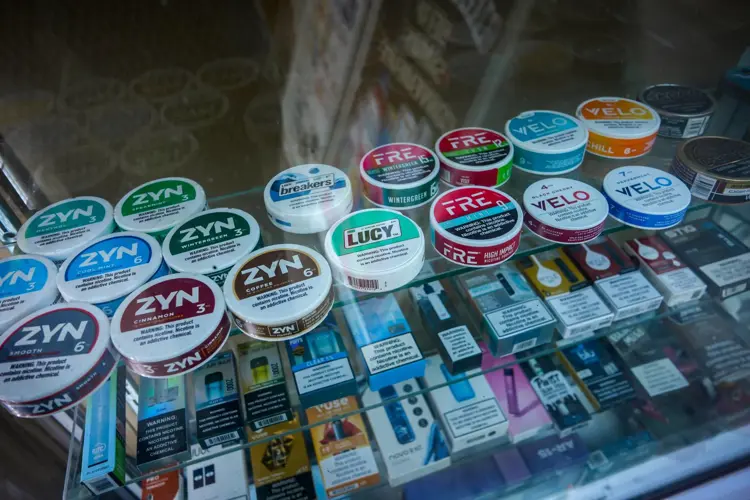June 20, 2023
New legislation in Ohio would ban the sale of all flavored vaping products (aside from tobacco and menthol) not specifically authorized by the FDA. If passed, the law would wipe out vape shops and eliminate legal access to products preferred by the vast majority of consumers, including disposable vapes and bottled e-liquid. But it would leave unauthorized vape products sold by major tobacco companies untouched.
The proposed flavor ban was included at the last minute as an amendment to the State Senate version of HB 33, the 2024-25 appropriations bill. The amendment received no public debate, and the bill was passed the day after it was added.
Opposition to the flavor ban must happen quickly
The flavor ban amendment was promoted to Ohio legislators by tobacco giant R.J. Reynolds, which sells Vuse vape products. The amendment is similar to bills previously introduced in other states that were supported by Reynolds and Juul Labs. Both companies sell vapes only available in tobacco and menthol flavors.
A case study in the influence large corporations hold over state lawmakers is playing out across the country.
Tobacco companies are shutting down their competition AND foisting off FDA enforcement on state departments without giving up a thing.https://t.co/t86ShJJGNR #ohpol
— Gregory Conley (@GregTHR) June 20, 2023
Both the Senate and House have passed their own versions of the appropriations bill, but differences between the bills (including the anti-flavor amendment) will require them to be reconciled in a conference committee before a final bill can be passed by the full General Assembly.
Committees will begin work on the final bill this week. The appropriations bill must pass (it funds the government for the next fiscal year), so opposition to the amendment must happen swiftly to persuade state legislators to leave the anti-flavor provision out of the final, reconciled bill.
CASAA has issued a call to action, alerting Ohio vape consumers to the sneaky amendment and providing Ohio vapers a simple way to oppose the flavor ban. Ohio residents can also call the offices of their State House and Senate members to urge opposition to the amendment.
What would the flavor ban amendment do?
The purpose of the anti-flavor amendment is to eliminate competition against R.J. Reynolds’ Vuse vape products. While the company’s Vuse Alto remains the single most popular device in the convenience store/gas station segment of the vaping market, it now faces retail pressure from newly popular flavored disposable vape products, and ongoing rivalry with open-system vapes (bottled e-liquids and refillable devices) sold mostly in vape shops.
The Ohio anti-flavor amendment, if it becomes law, would prohibit the sale of any flavored vaping product (aside from tobacco and menthol flavors) that has not been authorized for sale by the FDA.
The FDA has not authorized any vaping products in non-tobacco flavors, or any bottled e-liquid in any flavor. It has authorized just seven closed-system vaping devices (all made by companies owned by major tobacco corporations, including three Vuse products), and only tobacco-flavored refills for those products.
Because the law wouldn’t apply to menthol-flavored products, R.J. Reynolds’ popular Vuse Alto and its menthol pods would continue to be sold in Ohio, even though the Alto hasn’t received FDA authorization. But flavored disposable vapes and bottled e-liquids—even those with pending premarket tobacco applications (PMTAs)—would be illegal in Ohio.
The local preemption provision will only help tobacco industry vapes
The appropriations bill also includes a provision that would prohibit local governments in Ohio from passing their own tobacco- and vaping-related restrictions. Such a law would prevent cities and counties from passing product rules that could be stricter than the state’s, like the flavor ban passed by Columbus last year.
Even though this provision would be helpful to vaping consumers and vape shops if the state didn’t also ban flavored vapes, it’s really designed to prevent the passage of local laws that include a prohibition on menthol cigarette sales. Newport cigarette manufacturer R.J. Reynolds wants both provisions passed into law, which would outlaw flavored vapes and prohibit city governments from banning menthol cigarette sales.
However, following passage of the Columbus flavor ban, the General Assembly passed a similar preemption law, which was promptly vetoed by Governor Mike DeWine. There is no reason to believe that DeWine—who indicated he would gladly support a statewide ban on vape flavors—wouldn’t now use his line-item veto power to eliminate the new preemption provision, while signing the flavor ban provision into law.
Reynolds and BAT declare war on indie vape manufacturers
Reynolds and its parent company British American Tobacco (BAT) have recently engaged in a series of actions against disposable vapes that compete with their prefilled pod devices sold around the world under the Vuse name. And Reynolds has opposed the very existence of open-system products like bottled e-liquid, mods and tanks from the very start.
- In a 2014 comment on a draft version of the FDA’s Deeming Rule, R.J. Reynolds advised the agency to simply ban all refillable devices and bottled e-liquid. “Unlike closed-system products,” the company said, “open-system products are highly customizable. As a result, there is no way to adequately evaluate how such a product will work or to establish whether consistency of product composition and quality can be maintained.”
- In February of this year, Reynolds filed a formal FDA citizen petition, asking the agency to target disposable vapes for enforcement. The cigarette manufacturer said additional vape enforcement actions would “better protect public health.”
- Following a failed bid to buy disposable vape manufacturer Elf Bar in late 2022, Reynolds’ corporate parent BAT provided testing data to UK Trading Standards teams the tobacco company said “demonstrated consistent and widespread overfilling” of the disposable products. The actions came after a British newspaper conducted its own similar tests. BAT then sent letters to retailers warning them of “the risks of corporate and personal liability arising from the sale of non-compliant products.”
Great information, but if RJR is so pro harm reduction why are they sending 100's of cease and desist letters to vape shops? https://t.co/VHdKCgO93f pic.twitter.com/GviUZON0lu
— Allison (@alli_vapes) March 22, 2023
- Immediately after Reynolds’ citizen petition was filed, a bill was introduced in the House of Representatives that would require the FDA to update its vaping product enforcement guidance to specify “how the agency will prioritize enforcement against disposable ENDS products.” The bill received no support from tobacco control and anti-vaping groups, which believed the legislation came from Reynolds.
- Around the same time as Reynolds’ citizen petition and the introduction of the House bill, a bizarre anti-disposable campaign was launched by a little-known organization called Consumer Action for a Strong Economy (CASE). The initiative includes a huge signboard truck driving around Washington D.C. with images of a shady peddler opening his raincoat to show colorful disposable vapes for sale. The CASE website has recently been updated to praise the FDA for issuing import alerts to some Chinese shippers and warning letters to some disposable manufacturers.
- Over the past several months (and possibly going back to last year), Reynolds has sent threatening letters to vape shops and some other retailers, suggesting that sales of unauthorized vaping products could result in prosecutions under state law and lawsuits by Reynolds resulting in damage awards.
The Freemax REXA PRO and REXA SMART are highly advanced pod vapes, offering seemingly endless features, beautiful touchscreens, and new DUOMAX pods.
The OXVA XLIM Pro 2 DNA is powered by a custom-made Evolv DNA chipset, offering a Replay function and dry hit protection. Read our review to find out more.
The SKE Bar is a 2 mL replaceable pod vape with a 500 mAh battery, a 1.2-ohm mesh coil, and 35 flavors to choose from in 2% nicotine.
Because of declining cigarette sales, state governments in the U.S. and countries around the world are looking to vapor products as a new source of tax revenue.
The legal age to buy e-cigarettes and other vaping products varies around the world. The United States recently changed the legal minimum sales age to 21.
A list of vaping product flavor bans and online sales bans in the United States, and sales and possession bans in other countries.


















